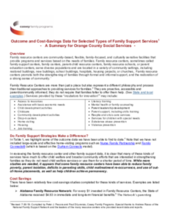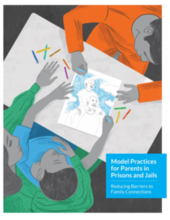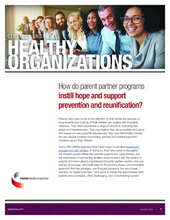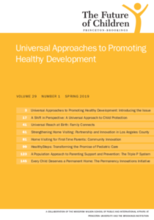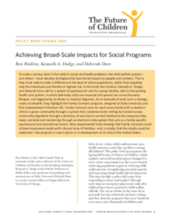Displaying 121 - 130 of 437
This document from Casey Family Programs reviews data on Family Resource Centers and other family support services in the US.
In this paper, the authors describe a process used to inform the development of a parenting intervention that would have high relevance to child welfare involved parents and could then work towards proving its effectiveness.
This brief outlines how US child welfare systems can implement these eight strategies to address existing disproportionalities and disparities for LGBTQ+ children, youth, and families.
The objective of this document, developed by the Bureau of Justice Assistance (BJA) and the National Institute of Corrections (NIC), in collaboration with the Urban Institute and Community Works West, is to detail a set of practices that correctional administrators in the United States can implement to remove barriers that inhibit children from cultivating or maintaining relationships with their incarcerated parents during and immediately after incarceration.
This study was aimed at assessing whether the Journey Up Mentorship Program in Salt Lake City improved outcomes for those aging out of foster care in the US state of Utah.
This study used qualitative telephone interviews with participants sampled from a statewide cohort of newly-hired, frontline child welfare workers. The authors used thematic analysis to consider participants' training experiences and the conditions that facilitated meaning.
This Casey Family Programs issue brief looks at the use of peer mentors (“parent partners”) who work with parents entering in and engaging with the child welfare system.
This volume explores universal social programs designed to serve entire communities as they move toward achieving population impact in reducing child maltreatment, strengthening parental capacity, and improving infant health and development.
In this brief, Ron Haskins, Kenneth A. Dodge, and Deborah Daro call for a system of psychosocial care for young families in the US, highlighting the the Family Connects program which aims to reach every family with a newborn child in a given community through a system that combines home visiting by trained nurses; community alignment through a directory of services to connect families to the resources they need; and data and monitoring through an electronic data system that acts as a family-specific psychosocial and educational record.
The current study used a quasi-experimental design and propensity score matching to examine the outcomes for children of families served by the Iowa Department of Human Services Parent Partner program, a peer support program to mentor parents who are currently involved in the US child welfare system.

